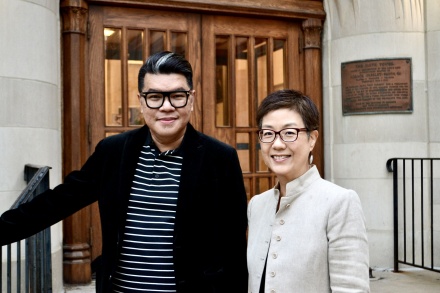Garrett-Evangelical Awarded Science for Seminaries Seed Grant for “Race, Technology, and Healing: Science and Religion in Dialogue” Project
September 22, 2021

Garrett-Evangelical Theological Seminary has been awarded a Science for Seminaries Seed Grant from the American Association for the Advancement of Science (AAAS) Dialogue on Science, Ethics, and Religion (DoSER) program. The grant will help fund the “Race, Technology, and Healing: Science and Religion in Dialogue” project led by Dr. Rolf Nolasco, Jr., Rueben P. Job professor of spiritual formation and pastoral theology, and Dr. Wonhee Anne Joh, professor of theology and culture.
Throughout the history of the United States, many communities have suffered traumas from systems and structures anchored on heteropatriarchal white supremacy. The psychological and physiological impacts of these group traumas often continue to affect communities through many generations. This project will bring racial trauma in conversation with science, religion, psychological, and cultural studies. Participants will address questions such as: who is considered human? Whose lives and livelihoods matter? What are scientific, socio-cultural, psychological, and theological consequences of trauma, and how can those effects be mitigated? How can scientists, psychologists, and theologians assist community leaders to help their communities heal and flourish?
“Until recent years, and especially when considering the sequelae of COVID-19, trauma studies have not focused on experiences of racialized violence as forms of trauma,” said Nolasco. “Given the definition of trauma in its disciplinary home as an event that is outside the ordinary range, as well as one that is often interpreted as singular and spectacular, it is no wonder that experiences of racism have been overlooked by trauma theorists and often unaddressed in seminary curriculum. This grant will enable us to critically expand the study of trauma and human resilience and make it more interdisciplinary – scientific, socio-political, and psychological – with real or material consequences.”
Joh added, “The category ‘science’ has often been used differentially against many racialized communities. This grant allows scholars from those communities to re-engage science on their terms. The grant also allows for Dr. Nolasco and I to continue our multiple collaborative engagements with each other as well as with our diverse faculty and students. As scholars, collaboration as an embodied pedagogical practice and commitment is central. We hope to model this for our communities that whether as scholars, pastors or activists we are never discrete individuals but always engaged in the process of mutual collaborative learning and unlearning.”
Three main components of the project include:
- A revision to the required foundational course, “Person in Community,” for master’s level students to reflect on the fullness of our humanity and what it means to be made in the image of God by examining theological, spiritual, and biopsychosocial development theories at the intersection of race, gender, sexuality, dis/ability, class, and more.
- A book discussion group for Garrett-Evangelical faculty and PhD students of color to provide participants with information, knowledge, and wisdom regarding the role of automated technology in exacerbating racial divide and racial trauma and together find ways to expose and resist it through their classes, scholarship, and solidarity work.
- A conference in Spring 2022 on “Human Flourishing: Science & Religion Dialogue” that will introduce participants to a new, body-centered understanding of white supremacy and its impacts – how science can trace the effects of bias in our blood, our nervous systems, and the expression of our DNA (neurobiology). Practices of mindfulness will also be introduced to mitigate the experience of racial trauma and to promote human flourishing.
Science for Seminaries is a project of the AAAS DoSER program, in partnership with the Association of Theological Schools. The project helps a diverse group of seminaries integrate science into their curricula and provides support and resources to seminary professors to encourage informed dialogue and a positive understanding of science among future religious leaders. Integrating science into seminary education will not only benefit professors and students, but ultimately it will enrich those in the pews who are interested in the discoveries and implications of science. Through the previous eight years of the project, 54 seminaries have received substantial grants from AAAS DoSER, including 12 seed grants in Summer of 2021.
The American Association for the Advancement of Science (AAAS) is the world’s largest general scientific society and publisher of the Science family of journals. AAAS was founded in 1848 and includes 261 affiliated societies and academies of science, serving millions of individuals. The nonprofit is open to all and fulfills its mission to “advance science and serve society” through initiatives in science policy, international programs, science education, public engagement, and more. Building upon its mission, AAAS established the Dialogue on Science, Ethics, and Religion (DoSER) program in 1995 to facilitate communication between scientific and religious communities. For the latest information and news about AAAS DoSER and the Science for Seminaries Seed Grant initiative, visit AAAS.org/DoSER and ScienceforSeminaries.org.
Garrett-Evangelical Theological Seminary, a graduate school of theology related to The United Methodist Church, was founded in 1853. Located on the campus of Northwestern University, the seminary serves more than 450 students from various denominations and cultural backgrounds, fostering an atmosphere of ecumenical interaction. Garrett-Evangelical creates bold leaders through master of divinity, master of arts, master of theological studies, doctor of philosophy, and doctor of ministry degrees. Its 4,500 living alumni serve church and society around the world.

